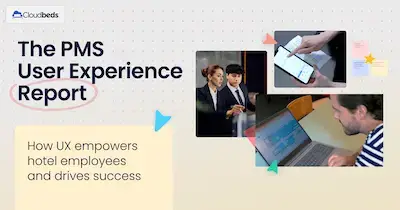
By Cloudbeds
What is a hotel operating system?
A hotel operating system is software used to manage a hospitality property’s overall day-to-day business, including bookings, guests, staff, revenue, payments, OTAs, reports, and more. Traditionally, it would be a property management system, used alone, with in-built capabilities, or in conjunction with integrated tools.
Dependable hotel management software should help you automate repetitive manual tasks, optimize the guest experience, maximize revenue and speed up front office operations. On top of having all those qualities, it needs to be user-friendly and easy to use so staff can be trained quickly.
Like any technology, your property management system (PMS) has a limited lifespan in its current form. Just as the software will evolve, so too will your property’s needs and goals. A PMS that was once valuable, can become outdated and should be upgraded.
Is your current software lagging? If your hotel management software is holding your operating efficiency back, then it may be time to switch systems and find a solution that better fits your needs. The following are the top 10 signs it’s time to upgrade your hotel property management system.
1. Your hotel PMS doesn’t easily integrate with third-party tools
Easy integration with third-party services, such as mobile guest check-in kiosks or reputation management tools, can maximize your business’s scalability in the hospitality industry. Third-party tools can also enhance the guest experience and allow you to customize your PMS to your property’s unique needs. Older, non-cloud-based hotel operating systems don’t usually connect to outside tools, and if you’re waiting for a newer version of your current software to become available, it could be months or even years for the next version of software to include the tools you need.
Modern, cloud-based hotel property management software like Cloudbeds will integrate with useful outside tools and services. A great example of this is a restaurant point of sale (POS) app that allows employees to verify guests’ occupancy status and room number, so charges from the property’s onsite cafe can go directly to their room bill. This makes the transaction more convenient for both you and the customer.
2. It doesn’t enhance the guest experience
Old hotel management systems don’t help deliver a good guest experience. Sure, they act like a CRM that you can later use to re-engage past guests, but otherwise, they don’t actively make the guest experience better.
Today, more and more guests are turning to self-service options at a property due to their speed and convenience. It’s been documented repeatedly that guests would rather use a mobile app to complete their check-in and reservations process before arriving at the hotel, so they can spend less time at the counter. When these types of apps link to your hotel operating system then the guest data is automatically synced. This cuts down check-in time for both your guests and front office or concierge staff.
A study by OpenMarket found that 90 percent of hotel guests in the U.S. and the UK, said that communicating with a hotel via messaging would be useful. Because of data like this, you should consider PMS solutions that include guest services automation or integrate with a chatbot tool so you can effectively communicate with your guests. A good email automation system will let you send emails based on triggers and will provide templates and customization options.
3. It’s not cloud-based
The problem with most older hotel industry systems is that they run on hardware installed on location. These hotel operating systems can only be accessed on-premise when the user logs in from the property’s computer system. They also require costly, specialized maintenance, and many providers tack on additional fees for support, performance upgrades, and customization of their software.
Cloud-based software solutions store data remotely, so users can log in to their system in real-time from anywhere with an internet connection. A cloud PMS is built for high performance and new functionality is updated easily. Additionally, pricing is usually subscription-based by SaaS providers and includes the cost of customer support, frequent system upgrades, security monitoring, and data hosting.
4. It takes a long time to train new employees
The true value of a property management system is defined by the people who are using its interface daily to run the property smoothly. Your PMS should be simple to use with an easy-to-understand dashboard. Drag and drop features can be helpful for new users to learn their way around a system fast.
Listen to your hotel staff. If they tell you a system is over-complicated, unstable, and has poor support, it’s time for a change.
5. Return on investment is low
A good hotel management system must deliver a high return on investment, after all, it is more than just an organizational tool for your back office. An efficient PMS needs to go above and beyond by helping to reduce costs, increase productivity, engage guests, save time and generate higher revenue.
With that in mind, look for a PMS that:
- Offers a mobile-friendly booking engine to help you increase direct bookings
- Has a channel manager for efficient room inventory management and sync with OTAs
- Includes comprehensive business analytics so you can make data-based decisions
- Has a built-in credit card payment processor or integrates to reputable payment gateways
- Serves as an efficient guest CRM to manage past and present guest data and special requests
6. You have a ton of overbookings
High-quality hotel management software will allow you to keep your competitive advantage and prevent overbookings. A reservation system without a channel manager requires you to manually update your rates across every OTA channel. Not only is this practice inefficient, but it’s also a major cause of overbookings.
A PMS with a channel manager will update your room inventory across all the channels you’re connected to in real-time so you don’t risk the same room being booked twice through different OTA sites. This allows you to diversify your distribution strategy with numerous channels, from Expedia and Booking.com to local travel agents and sites.
An ideal PMS should act as an all-in-one solution and can help manage many aspects of your hotel operations because of its ability to communicate with other channels, including your online booking engine for bookings via your own hotel website.
7. Your housekeeping status does not update in real-time
Your hotel management system should help you run your hospitality business more efficiently in every way possible and this includes housekeeping and maintenance management. A productive PMS will let you organize and manage housekeeping from the dashboard, so you can get immediate updates on room status and conditions, assign housekeeping staff to rooms, and add room notes as needed.
8. It lacks revenue management capabilities
Pricing and distribution know-how is difficult. The proper hotel management software should offer revenue management system capabilities to help you gather market data and compare your pricing with competitors. In short, it must allow you to make the best strategic pricing decisions so you’re taking in the maximum possible revenue and profits.
Today, revenue management technology is not a hotel chain exclusive. Independent hotels, small hostels, motels, B&Bs, and any property type can easily get access to pricing intelligence technology.
9. Keeping track of business data is difficult
An effective PMS makes it easy to pull comprehensive and visual reports with a few simple clicks to see if your marketing efforts are paying off. How much business did each OTA give you this month? Are your RevPar and ADR reports on track? All this data should be easy to see. An upgraded PMS lets you generate visual reports that you can customize by filtering data like room type, marketing channel, year, specials, and more.
10. You’ve lost confidence in cash-flow management across your property
If keeping track of cash transactions at your front desk, room service, pool, bar, gift shop or café is getting difficult, then that’s a good indication that you need to upgrade your PMS.
Look for a hotel management system that will help you manage multiple cash drawers across your property so that you know your business isn’t losing money. Some PMS software even lets you keep track of cash by linking the drawers to each user by shift. That way you can get automated reports of cash transactions and balances at the end of each shift.
Final thoughts
Don’t let an outdated PMS hold you back from new opportunities. Make life easier with an efficient hotel management system that automates hotel operations and maximizes revenue.
In the end, by utilizing cloud-based PMS technology like Cloudbeds you can easily make your hotel operations run smoother and more profitably.



















